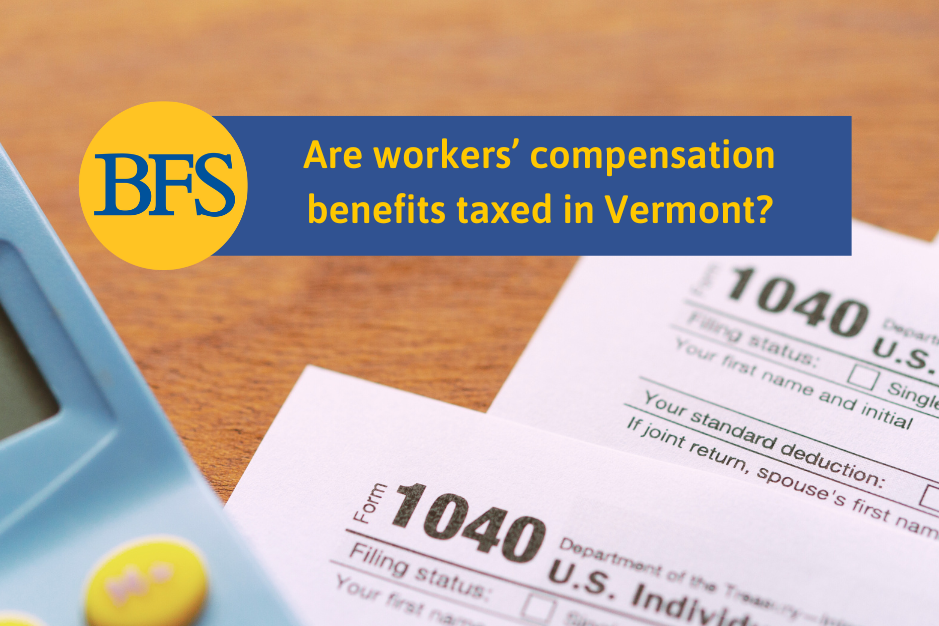Are My Vermont Workers’ Compensation Benefits Taxed?

At tax season, clients often ask us if they have to pay taxes on money they got from workers’ compensation benefits, a personal injury settlement, or Social Security disability payments.
The short answer is: in Vermont, you do not have to pay tax on workers’ compensation payments or personal injury settlements, but Social Security disability payments are taxed. Our attorneys explain below how an injury or disability payment could affect your tax return.
Be sure to talk to a tax specialist if you have any specific questions or concerns. See our blog post on free tax help for more information.
Are workers’ compensation payments taxed?
Money can be tight after a work injury, but there is one bright spot: money you are paid from a workers’ compensation claim is not considered taxable income by the State of Vermont or the IRS. This means that you don’t owe any taxes on your weekly wage replacement checks or on a lump sum payment (if you decide to settle your claim).
Because workers’ compensation is not considered to be taxable income, you don’t need to include it on your tax return. You won’t get a W-2 for your workers’ compensation benefits and you don't need one to file your taxes. But keep in mind that workers' compensation money is considered unearned income, which means that it can affect your income eligibility for some Vermont tax credit programs, such as the Renter Credit and the Property Tax Credit.
Are personal injury settlements taxed?
Money that you get in a personal injury settlement is not taxable in Vermont. This money is meant to compensate you for personal losses from an injury by helping to cover your medical bills, lost wages, emotional distress, loss of earning capacity, and more. No part of your personal injury settlement or award will be taxed—not the expenses, not the fees, and not your settlement money. Note: In certain unusual situations, lost wage compensation can be taxable.
Are Social Security disability benefits taxed?
In Vermont, Social Security disability benefits are taxed, but not in the same way as most other income. The amount you owe depends on three factors:
- Do you have other sources of income? If your income is low, you likely won’t owe any tax. But if you have other income that puts you over a certain threshold, then part of your Social Security disability benefits may be taxed. For more information, view the Social Security Administration’s Benefits Planner or talk to a tax specialist.
- Do your Social Security benefits cover more than one tax year? If you got a large, lump-sum check for retroactive benefits that cover more than one year, this might affect how much tax you pay. Consult with a tax specialist—such as a certified public accountant (CPA) or a lawyer who specializes in tax issues—to see if you will owe tax on any portion of that amount.
- Did you also get workers’ compensation benefits? See the section below on receiving both types of payments.
What if I get workers’ compensation benefits AND Social Security disability payments?
If you’re getting paid both workers’ compensation benefits and Social Security disability benefits (SSDI), your SSDI benefits might be reduced (offset) by the amount of your workers’ compensation payments. The offset amount could then be taxable.
In this situation, you might get a 1099 form from the Social Security Administration (SSA) that shows you owe taxes for money that the SSA never actually paid you because it was offset due to workers’ compensation payments. This is a harsh result but remember this: if the only “income” you had for tax purposes was the unearned SSDI, it may be below the threshold for paying state and federal taxes. It is important to check with a tax professional.
Dealing with two types of benefits (workers’ compensation and Social
Security disability) is complicated. It's often helpful to talk to an
attorney who understands both types of claims. At BFS, we have years of
experience helping clients in this situation. We can help you structure
your workers’ compensation settlement to minimize the offset and
maximize the amount of money you get to keep.
Tax returns are due Tuesday, April 15, 2025, so don’t delay. If you are in any doubt about whether you owe tax on your workers’ compensation benefit payments, personal injury settlement, or Social Security disability benefits, contact a CPA, a tax attorney, or a free tax preparation service soon.
If you have questions about filing a workers’ compensation or personal injury claim, call or text us at 802-455-9141 to schedule a free case evaluation today.
Get a FREE Case Evaluation Today
Send us a short message describing your case, and our lawyers will get back to you as soon as possible. Our office hours are Monday–Friday 8:30 a.m.–5:00 p.m.